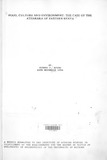| dc.description.abstract | This study explored the cultural institutions of the Atharaka so as to identify the strategies they use to cope with food shortages in their drought-prone environment. The economic and cultural institutions of the Atharaka were explored so as to identify the coping strategies within their food procurement. Attention was focused on the way the Atharaka conceptualize food, environment, and the forces of change that impinge upon their culture.
The rationale was to highlight the potentials of indigenous knowledge and coping strategies in both food production as well as environmental management. The study was to fill the gaps in the knowledge of how communities cope with food scarcity during ordinary food shortfalls. Such knowledge is useful for laying the basic foundation and strategies for reducing vulnerability to both short and long term food shortages for a given community. It is also crucial for Kenya's food and environmental policies.
Both qualitative and quantitative methods of data collection and analysis were used. Ethnographic methods such as in-depth
interviews, formal and informal interviews, direct and non- participant observation, focus group discussions and key informant interviews were employed. Secondary data was mainly library studies whereby available written literature and
archival materials were perused so as to determine the gaps of knowledge which needed filling.
This study found that the economic and cultural institutions of the Atharaka are well able to cope with food shortages in their drought-prone environment. Coping strategies were found to be within the experiences of nearly everyone of the respondents in Tharaka. Unfortunately this knowledge has not received support from development agents in the area. Forces of change are also making it difficult for their traditional coping strategies to continue yielding the required food. Disintegration of cultural and economic institutions is a threat to food security and environmental management.
The study recommended a deliberate official commitment to supporting the Atharaka's coping strategies which clearly have a capacity to maximize on the scarce environmental resources. Promoting these strategies is likely to enhance techniques of responsible and sustainable manipulation of their semi-arid ecosystem. Although these coping strategies have proved successful over the years, they now require strengthening so as to deal with the forces.of change. Current transfer of technology
ought to be discouraged for it is likely to reduce
vulnerability from food shortages. | en |

